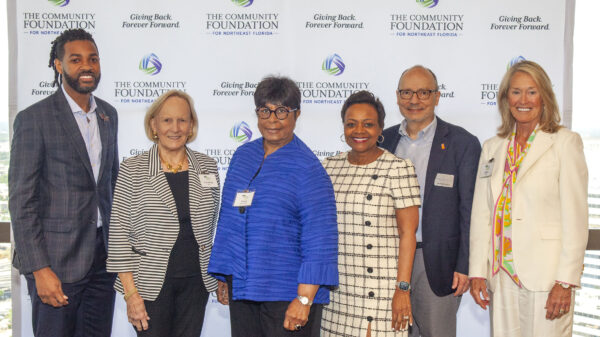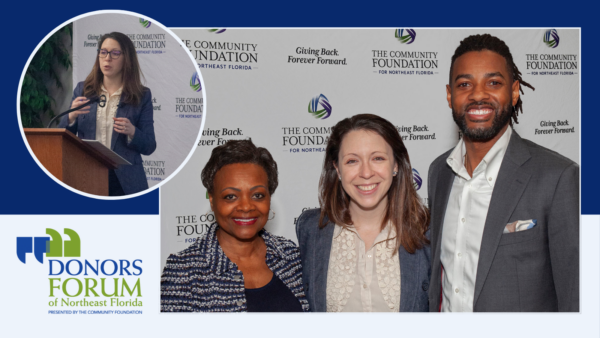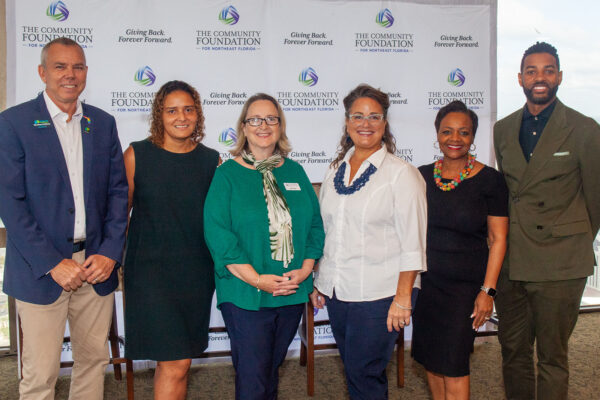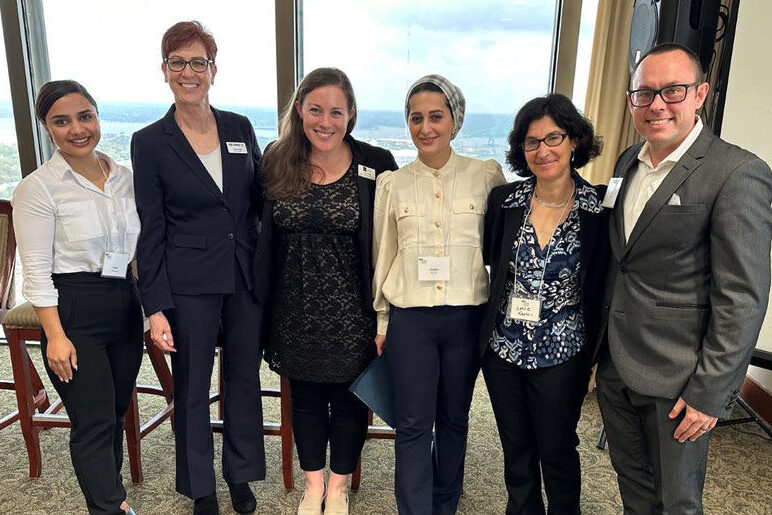On February 28, 2023, The Community Foundation for Northeast Florida hosted a Donors Forum to discuss Refugee Resettlement in Northeast Florida. The program opened with an introduction by TCF Vice-President of Donor Services Tom Caron. Dr. Leslie Kaplan, Director of the Hicks Honors College at University of North Florida, presented an overview of refugee resettlement on a global, regional, and local level.
Highlights from Dr. Leslie Kaplan:
- The term refugee is a subset in a category of legal immigration. The legal definition is someone who is fleeing persecution, war, or violence (specifically, human-caused issues). Refugees must apply from a third country – they do not live in the application country while they are undergoing the process.
- As of 2022, there were 103 million displaced persons around the world – this is a larger population than any single European nation. There are 32.5 million refugees, with 72 percent (2022 figures) coming from just five countries – Syria, Venezuela, Ukraine, Afghanistan, and South Sudan. Sixty-two percent are women and children, with 11 percent of the children under 5 years old.
- The screening process to obtain refugee status takes a minimum of 18 months and includes extensive background checks, which occur at multiple stages throughout the process, multiple security and medical screenings, interviews (often multiple rounds), travel screening, and proof of the reasons for the request of refugee status. Once refugee status is approved, applicants are given notice (usually a few weeks) of where they will be going (a location is assigned to them – they do not choose). They are flown there, and they have a certain amount of time to pay the government back for travel expenses.
- Resettlement consists of housing in a basic, low-rent apartment, assistance with enrolling in public assistance, schools, employment services, etc. The official government resettlement assistance program lasts for 90 days, after which families are required to be self-sufficient.
- Refugee resettlement was always a bipartisan-supported issue from its inception during WWII until around 2015/2016, when it became a politically-charged topic and the numbers of refugees to the U.S. began to fluctuate, depending on the administration in power.
- Although it has been a bipartisan-supported issue since its inception, over the last several years, the number of refugee admissions to the U.S. under the Refugee Resettlement Program fell dramatically, due to becoming a politically-charged topic. In 2021, the U.S. only resettled 11,411 refugees – the lowest number since the program began in 1980. In 2022, resettlement numbers were around 26,000.
- With the crises in Afghanistan in 2021 and Ukraine in 2022, a large influx of refugees were admitted on a temporary basis, which caused organizations that had downsized to have to quickly build their programs back. This remains an ongoing challenge today.
- Jacksonville has the widest diversity of refugees in the state, with the top countries represented currently being Ukraine (40%), Afghanistan (30%), Burma, Syria, Sudan, Guatemala, and Iran.
- In Florida, 20 percent of the population is foreign-born, 25 percent of workers in the state are immigrants, and 13 percent of native-born Floridians have at least one immigrant parent.
- In Jacksonville, the positive economic impacts of immigration have been $1.4 billion taxes paid by immigrants and 9,000 immigrant entrepreneurs and small business owners.
Panel Discussion
Highlights from Laura Cook, Director of Refugee Resettlement Programs for Lutheran Social Services and State Contract Manager for refugee programs in Jacksonville:
- Lutheran Social Services is the second Jacksonville organization to provide official resettlement services; in addition to handling initial resettlement cases for the first 90 days, it offers a career laddering program, youth mentoring for ages 14-24, and services for vulnerable refugee populations. Staff members of Lutheran Social Services speak more than 20 languages and represent a number of refugee populations.
- In 2020, the organization resettled 32 families, in 2021, it was 60, and in 2022, almost 400 (with many Afghan and Ukrainian families). The exponential number increases have required extensive program rebuilding in the organization.
- Immediate needs include: volunteers in all areas of expertise to offer skill-building workshops, financial donations, in-kind donations to provide families with basic needs, and one-on-one volunteers to work directly with families.
Highlights from Hellai Noorzai, Refugee Resettlement Program Manager, Catholic Charities:
- Hellai came to the U.S. as a refugee herself in 2015, and she has worked for Catholic Charities for six years.
- Catholic Charities works closely with the federal government to provide reception and placement programs for refugees. It is one of two organizations in Jacksonville that serves as an introduction to the country/city and provides the first 90-day services to incoming refugee families.
- Private sponsorships of families are an option, with information about these opportunities available via the organization Welcome Corps.
- Immediate needs of Catholic Charities are donations to furnish and outfit apartments for families, financial donations, and volunteers to help sort donations and work with refugee families.
Highlights from Lori Chelf, Co-founder of Beyond 90, which provides support services the initial 90 days of official resettlement support have ended:
- After the first 90 days, refugees still have a variety of needs. Beyond 90 was founded to bridge the gap between the end of resettlement services and self-sufficiency. It has served more than 3,000 families from 53 different countries.
- Support needs include housing assistance, educational and employment programs that lead to improved jobs and income, child care, transportation, financial literacy, and mental health counseling.
- Beyond 90 is the contracted provider for the refugee health program to provide mental health assistance. It staffs clinicians who are trained in refugee trauma and recovery. One important facet of self-sufficiency is being able to heal from the myriad of traumas that refugees encounter.
- Beyond 90 is undertaking a housing initiative and is in the process of signing a land lease. The organization will start a capital campaign at the end of the year to raise money for this initiative.
- Future challenges include adding more staff and raising money for growing needs, including the housing initiative.
Highlights from Basma Alawee, Founder of WeaveTales, an advocacy non-profit that gives a voice to refugee stories and supports global efforts to help refugees find a home:
- Coming from Iraq as a refugee in 2010, Basma experienced firsthand the difficulties of integrating into American society and all the challenges that went with being a refugee. WeaveTales was founded to share refugee stories, empower refugees to speak on their own behalf, and advocate for refugee resettlement.
- The vetting process for refugees has become more arduous and dis-coordinated since 9/11, adding a number of barriers for those trying to navigate it. Also, many United States Refugee Admissions Program (USRAP) offices have been closed, so there are not as many locations to apply.
- Ten years ago, there was an average of 70,000 refugees admitted each year. By 2017, there was a huge drop in those numbers. In 2020, there were 1,375 interviews conducted in the U.S. In 2022, there were 44,000 interviews conducted. The refugee cap for 2023 has been set at 125,000 by the administration; however, due to the process and limited resources, there will likely only be around 27,000 admitted.
- Immediate needs are: hold the administration accountable for the rebuilding of the refugee resettlement program, support robust funding for these efforts, and support legislation to strengthen these programs.

The Impact of Collective Giving
On April 17, 2025, The Community Foundation for Northeast Florida hosted a Donors Forum at the River Club to discuss The Impact of Collective Giving. The featured speaker was Michael Layton, Philanthropy Chair at the Dorothy A. Johnson Center for Philanthropy.

Trends in Philanthropy
On March 25, 2025, The Community Foundation for Northeast Florida hosted a Donors Forum at the UNF Adam H. Herbert University Center to discuss Trends in Philanthropy. The featured speaker was Tory Martin, Director of Communications and Strategic Partnerships for the Dorothy A. Johnson Center for Philanthropy, which just released its report 11 Trends in Philanthropy for 2025.

The State of LGBTQ Philanthropy
On October 23, 2024, The Community Foundation for Northeast Florida hosted a Donors Forum to discuss the State of LGBTQ Philanthropy.
